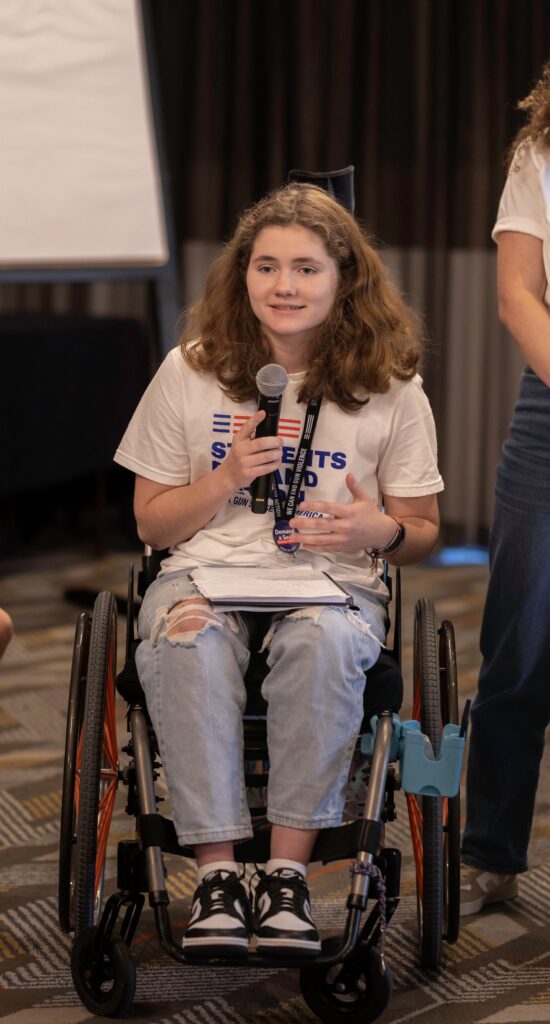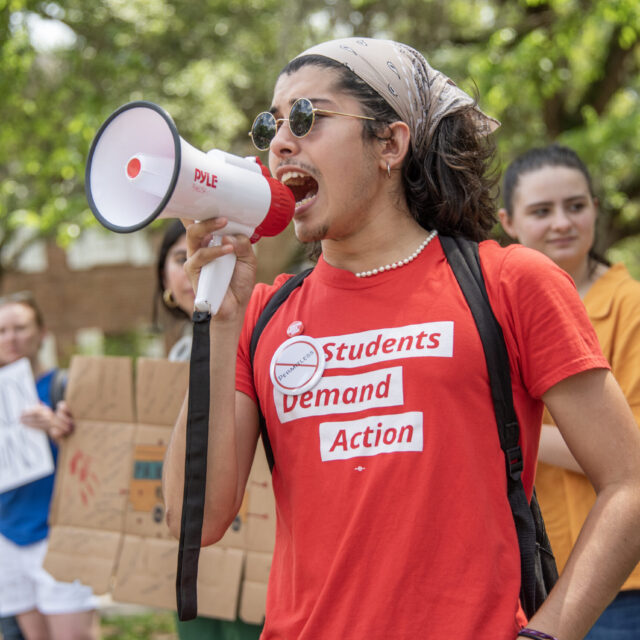
What Does Disability Pride Month Mean to You? Three Members of the Students Demand Action Disabled Students Affinity Group Respond
July is Disability Pride Month, a time to celebrate the perspectives, identities, and resilience of people with disabilities. Disability Pride Month celebrates how far we have come in the movement for disability justice. However, it is also a reminder of the importance of the ongoing struggle for equal protection and rights that the disability community continues to advocate for.
Disability Pride Month falls in July because it commemorates the 1990 signing of the Americans with Disabilities Act (ADA). The ADA was, and is, a revolutionary civil rights law designed to protect people with disabilities from discrimination in areas such as:
- Employment
- Housing
- Education
- Access to spaces or services
There are many different kinds of disabilities. Some might be more visible than others, like those that require someone to use a mobility aid like a cane, walker, or wheelchair. Others, such as sensory processing disorders or learning disorders like dyslexia, can be harder for others to perceive. All disabilities, regardless of their cause or how they present to others, shape how someone navigates through and experiences the world—including advocacy work.
People with disabilities, like many historically marginalized groups, are also disproportionately impacted by injustices in areas like housing, education, and healthcare. These same injustices exacerbate the impact of America’s gun violence crisis, including on the disability community.Creating space for people of all backgrounds to contribute to and engage in our movement is a key part of the work for a safe and just future. But we also must ensure that we provide trauma-informed and specific support for those who particularly experience the weight of the work for gun violence prevention. That’s why we created Students Demand Action Affinity Groups for our leaders and volunteers. In these spaces, students who share similar identities and lived experiences from across the country come together to:
- Create community,
- Share their experiences, and
- Access resources for the group’s benefit and empowerment.
This month, we asked three members of the Students Demand Action Disability Affinity Group to share what their identity means to them and why it is important to celebrate Disability Pride Month. Their answers are below.
Note: We understand that there are many ways that people talk about and relate to identities and disabilities. We have left intact the phrasing each student used while discussing these topics to respect their preferences. Answers have been lightly edited for length and clarity.

Grace Springer (she/her)
Leader of the Students Demand Action Disabled Students Affinity Group
This month allows us to reflect on how far the disabled community has come. Those who fought for our rights, such as through the 504 protests, paved the way for us. Understanding their work shows us what we still have to achieve and how important it is for everyone to come together as one. I am incredibly proud to be disabled.

Adam (they/she/he)
Disabled Students Affinity Group Member
Disability Pride Month means feeling comfortable being your true, unapologetic self.

Megan Egstad (she/her)
Disabled Students Affinity Group Member
Disability Pride Month reminds us and others of the fight the people with disabilities who have come before us have done to get equal protections. It also reminds us of the continued fight we still have. This month also provides an opportunity for younger disabled people to see older disabled people, and how they have been able to succeed.
Is your work to end gun violence influenced by your identity as a disabled person? If so, how?
Grace Springer (she/her): As a disabled person, I’m reminded how privileged I am to have this platform with Students Demand Action. There are so many people who are unable to speak out about gun violence. Gun violence does not discriminate and affects everyone no matter age, race, ability, orientation, and more. Being disabled shapes everything that I do. As I am here fighting to end gun violence, I hope to use my disability as a form of pride, but also to educate others on how this issue is very intersectional.
Adam (they/she/he): Yes. As someone with two disabilities as well as having a queer identity, I am of greater risk of being impacted by gun violence than my neurotypical peers. I want to make myself and everyone who is a little bit “different” safer.
Megan Egstad (she/her): Yes. My disability was not caused by gun violence, but I know many people who are permanently disabled (mainly from spinal cord injuries) due to gun violence. When it comes to gun violence in schools, disabled people are commonly left out when schools make response plans for active shooter and other emergency situations—and they are left for dead because of this lack of inclusion.
Why is it important to raise the voices of people with disabilities in the gun safety movement?
Grace Springer (she/her): The effects of gun violence are not linear and affect everyone differently. Understanding the intersectional lenses and how all people are affected is important to create a holistic and educated community that will value and fight for everyone.
Adam (they/she/he): Even though disabled people are more vulnerable to gun violence, our opinions are often overlooked or silenced. Raising our voices and showing others the uniqueness and pride of being a disabled person—as well as any type of person—can bring new light in the fight to end gun violence.
Megan Egstad (she/her): People with disabilities need to be more involved in conversations about gun violence prevention and response for many reasons, including because someone might, in fact, be disabled by the consequences of gun violence. Not only that, disabled people are commonly left out of these types of conversations and comprehensive school shooting response plans—leaving disabled students to fend for ourselves. It shouldn’t be this way.
After decades of organizing, the Americans with Disabilities Act was passed in July of 1990, 35 years ago this year. What is your hope for the disabled community in the next 35 years?
Grace Springer (she/her): Within the next 35 years, I hope to see both social and political improvements. Social improvement looks like normalizing accommodations and fighting against stigma. Political gains could look like strengthening community supplemental security income, and allowing disabled people to exist without having to justify their existence through monetary value.
Adam (they/she/he): I hope the community of people with disabilities continues to fight against the stereotypes and stigma surrounding mental health and abilities. That’s how we can create a safer, more loving, and more accepting community.
Megan Egstad (she/her): I hope that there will be more opportunities offered to people with disabilities, and that more people will make an effort to understand our experiences. People with disabilities can do the exact same things everyone else can, but they might think or get around a little differently in the process.
What would you tell young people with disabilities who might be afraid of what the future holds?
Grace Springer (she/her): There are so many people with disabilities in the world. Our community has existed through history and will never be erased.
Adam (they/she/he): I would want them to know that they are never in this alone. Even when it feels hopeless, unfair, and horrible, there are always ways to make yourself feel better, as well as others who can help you advocate for yourself and help the community. I want them to know that no one has the power to destroy who you are, because love and education will prevail over hate.
Megan Egstad (she/her): You are capable of doing any job, hobby, or degree that you want—you just may do it a little differently.
The Latest

Voter Guide: What To Know Before Election Day

I Can’t Vote—But I Can Still Get Involved and Have a Say in the Election

What Is a Weekend of Action?


